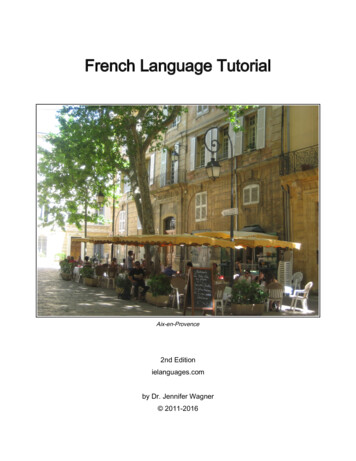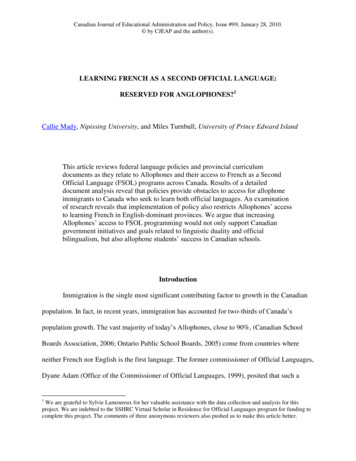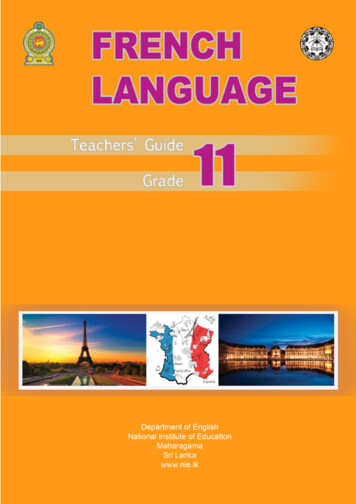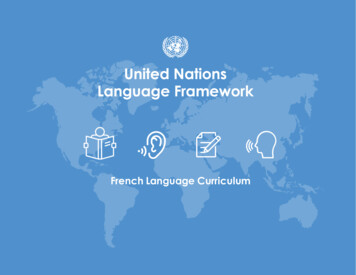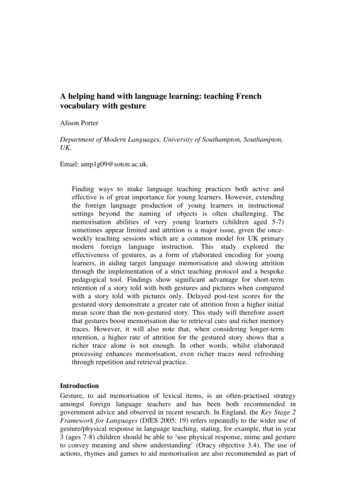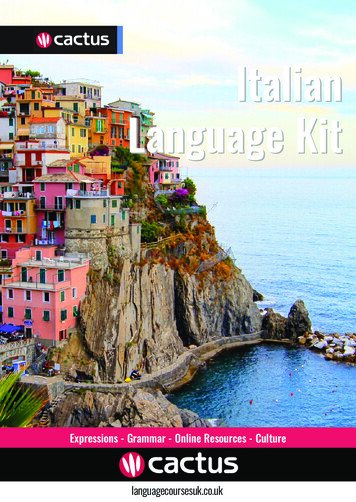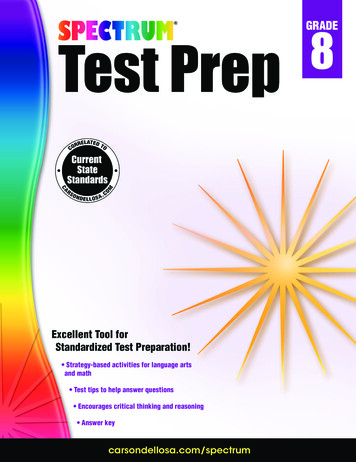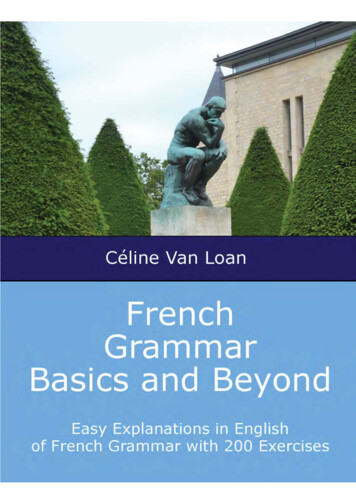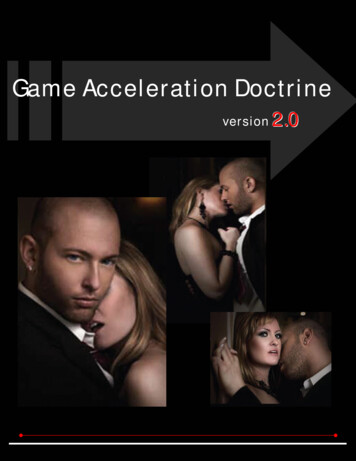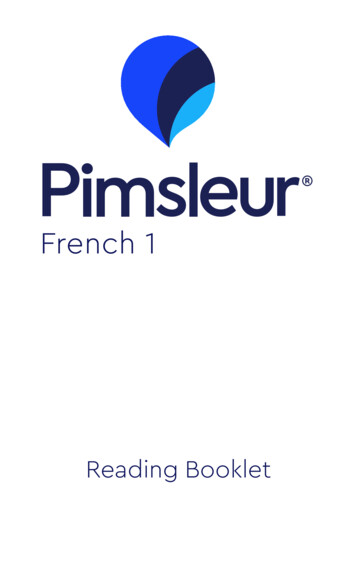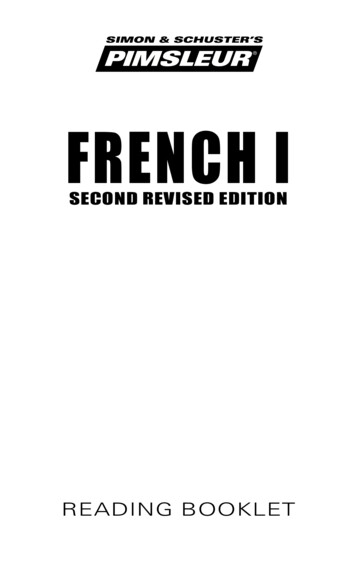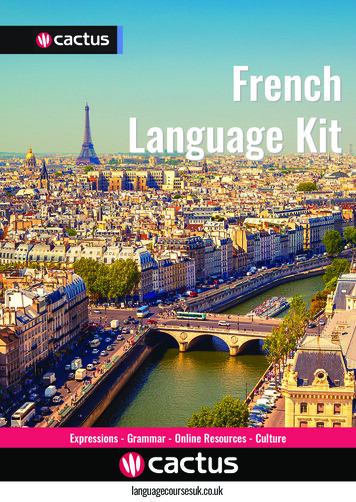
Transcription
FrenchLanguage KitExpressions - Grammar - Online Resources - Culturelanguagecoursesuk.co.uk
IntroductionWhether you plan to embark on a new journey towards learning French or you just needa basic reference booklet for a trip abroad, the Cactus team has compiled some of themost helpful French expressions, grammar rules, culture tips and recommendations.French is one of the most important languages in the world, and as such is extremelypopular with Cactus language learners. Spoken by 220 million people across France, Belgium, Switzerland, Canada, many African countries and other parts of the world, Frenchwill not only enhance your travel experiences but will also enable you to indulge in therich culture, literature, history and gastronomy of French speaking countries. Not onlythat, but French is in high-demand in the professional world, increasingly so in Africa.Learning French is the beginning of an exciting adventure that is waiting for you!The Cactus Team3.4.5.8.10.11.12.15.Essential ExpressionsGrammar and NumbersUseful VerbsOnline ResourcesTake a Language HolidayCultural DifferencesFrench Culture RecommendationsStart Learning French2Contact usTelephone (local rate)0845 130 4775Telephone (int’l) 44 1273 830 960Monday-Thursday: 9am-7pmFriday: 9am-5pm
Essential ExpressionsHelloGoodbyePleaseThank youYesNoExcuse me/sorryMy name is What is your name?Nice to meet youWhere do you come from?I come from Great Britain/AmericaHow are you?Where is ?I would like (2 bottles of water)How much is that?How do I get to ?I don’t understandI’m sorry, I don’t speak FrenchDo you speak English?Bonjour (bohn-zhoor)Au revoir (oh-reh-vwar)S’il vous plaît (see voo play)Merci (mehr-see)Oui (we)Non (nohn)Excusez-moi/désolé(e) (ehk-kew-zay mwah)Je m’appelle (zhuh mah-pehl)Comment vous vous appelez? (kohn-mahn voo voo zah-play)Enchanté(e) (ohn-shahn-tay)Vous venez d’où?Je viens de Grande Bretagne/des États-UnisÇa va? (sah vah)Où est ? (oo es.)Je voudrais (deux bouteilles d’eau)C’est combien? (say comb-bee-en)Comment aller à ? (co mo alay ah)Je ne comprends pas (zhuh nuh kohn-prahn pah)Je suis désolé(e), je ne parle pas français Parlez-vous anglais? (pahr-lay voo ahn-leh)3
Grammar and NumbersIndefinite articlesMasculineFemininePossessivesSingular Pluralun cahier des cahiersune table des tablesMasculine Feminine Pluralsingular singular1st person mon père ma mère mes parents2nd person ton père ta mère tes parents3rd person son père sa mère ses parentsDefinite articlesNote: Always use the definitePluralSingulararticle l’ before a noun startingMasculine le boulevard / l’arbre les boulevards / arbreswith a vowel.Feminineune table / l’église des tables / églisesNumbers0zéro10 dix-septdix-huitdix-neuf20 vingt21304050607080901004vingt et 001000deux centstrois centsquatre centscinq centssix centssept centshuit centsneuf centsmille
Useful VerbsAvoir (to have)Être (to be)Presentj’aitu asil anous avonsvous avezils ontPresent perfectj’ai eutu as euil a eunous avons euvous avez euils ont euPresentje suistu esil estnous sommesvous êtesils sontPresent perfectj’ai ététu as étéil a éténous avons étévous avez étéils ont étéImperfectj’avaistu avaisil avaitnous avionsvous aviezils avaientPluperfectj’avais eutu avais euil avait eunous avions euvous aviez euils avaient euImperfectj’étaistu étaisil étaitnous étionsvous étiezils étaientPluperfectj’avais ététu avais étéil avait éténous avions étévous aviez étéils avaient étéFuturej’auraitu aurasil auranous auronsvous aurezils aurontFuture perfectj’aurai eutu auras euil aura eunous aurons euvous aurez euils auront euFutureje seraitu serasil seranous seronsvous serezils serontFuture perfectj’aurai ététu auras étéil aura éténous aurons étévous aurez étéils auront été5
Useful VerbsManger (to eat)Finir (to finish)Presentje mangetu mangesil mangenous mangeonsvous mangezils mangentPresent perfectj’ai mangétu as mangéil a mangénous avons mangévous avez mangéils ont mangéPresentje finistu finisil finitnous finissonsvous finissezils finissentPresent perfectj’ai finitu as finiil a fininous avons finivous avez finiils ont finiImperfectje mangeaistu mangeaisil mangeaitnous mangionsvous mangiezils mangeaientPluperfectj’avais mangétu avais mangéil avait mangénous avions mangévous aviez mangéils avaient mangéImperfectje finissaistu finissaisil finissaitnous finissionsvous finissiezils finissaientPluperfectj’avais finitu avais finiil avait fininous avions finivous aviez finiils avaient finiFutureje finiraitu finirasil finiranous finironsvous finirezils finirontFuture perfectj’aurai finitu auras finiil aura fininous aurons finivous aurez finiils auront finiFutureFuture perfectje mangeraij’aurai mangétu mangerastu auras mangéil mangerail aura mangénous mangerons nous aurons mangévous mangerez vous aurez mangéils mangeront ils auront mangé6
Useful VerbsDire (to say)Faire (to do)Presentje distu disil ditnous disonsvous ditesils disentPresent perfectj’ai dittu as ditil a ditnous avons ditvous avez ditils ont ditPresentje faistu faisil faitnous faisonsvous faitesils fontPresent perfectj’ai faittu as faitil a faitnous avons faitvous avez faitils ont faitImperfectje disaistu disaisil disaitnous disionsvous disiezils disaientPluperfectj’avais dittu avais ditil avait ditnous avions ditvous aviez ditils avaient ditImperfectje faisaistu faisaisil faisaitnous faisionsvous faisiezils faisaientPluperfectj’avais faittu avais faitil avait faitnous avions faitvous aviez faitils avaient faitFutureje diraitu dirasil diranous dironsvous direzils dirontFuture perfectj’aurai dittu auras ditil aura ditnous aurons ditvous aurez ditils auront ditFutureje feraitu ferasil feranous feronsvous ferezils ferontFuture perfectj’aurai faittu auras faitil aura faitnous aurons faitvous aurez faitils auront fait7
Online ResourcesThere are so many free online resources that it is sometimes difficult to know which ones touse, and to identify which ones are good. Cactus has carefully assessed the wide range of freelanguage learning resources available online to provide you with a selection of our most recommended, useful and reliable sources of information for learning French. These can be used as ahelpful support to language learning whilst taking one of our face-to-face French courses.DictionariesWordReference is a popular bilingual dictionary, and combines its own dictionary with the longestablished Collins dictionary. WordReference also includes a handy French verb conjugator anda forum where users can get help with French language related questions.Reverso is a well-established online bilingual dictionary. It includes an English-French dictionary, along with other handy tools such as a translator and spellchecker.The CNRTL host the dictionary of the Académie Française, the French language regulator. Itsmonolingual French dictionary includes all the officially recognised French words. In French only.The Dictionnaire Electronique des Synonymes, hosted by the university of Caen, France, isa helpful online French synonyms dictionary. In French only.PronunciationForvo is a free and comprehensive pronunciation guide maintained by native speakers around theworld. It includes the pronunciation of more than 3 million words in 325 languages.8
Online ResourcesVocabularyMemrise is a popular website and mobile app which enables you to memorise French vocabulary.It is a great and fun way to learn new vocabulary in addition to your language course.Quizlet is a fun and simple website and mobile app which will help you develop your Frenchvocabulary using flash cards.Cram has a large list of flash cards to help you learn new French words. It also has a mobile app,so you can memorise French vocabulary anywhere anytime.Language Guide is a project helping French language students to build their vocabulary usingan image and sound dictionary.Mobile appDuolingo is a fun mobile app which offers a comprehensive series of vocabulary, pronunciationand translation exercises. It is a great way to practice what you learn during your French eveningcourses while on the go.9
Take a Language HolidayTaking an immersion course abroad is a very efficient way to quickly improve your French language skills. Not only it will increase your confidence in speaking French, but it will also be aunique opportunity to discover and experience the culture of a French-speaking country andpractice French with native speakers on a daily basis. Cactus has teamed up with the best language schools across the world to offer you a first-rate language learning experience.FranceThe most popular language holiday destination among Cactus French learners, France is also acountry with a rich history, culture, and gastronomy. Cactus offers immersion courses in varioussettings including large and bustling cities such as Paris and Lyon, mountain destinations such asAnnecy and Chamonix, and sunny coastal destinations such as Antibes, Biarritz and Montpellier.CanadaCactus offers French immersion courses both in Montreal and Quebec.The Caribbean and the Indian OceanIf you prefer to study French in a more exotic location, the French islands of Guadeloupe andMartinique in the Caribbean, and Reunion Island in the Indian Ocean are waiting for you. You willhave the opportunity to discover colourful and rich creole cultures, and stunning beaches andnatural landscapes.SwitzerlandFrench is spoken in the western part of the Confederation. If you want to learn French whileenjoying Swiss chocolate, breath-taking alpine landscapes and picturesque towns, then Switzerland is for you! Cactus offers immersion courses in Lausanne.10
Cultural DifferencesEvery culture has its specificities, and as fascinating as they can be, not knowing them can provesurprising and challenging when travelling. To help you blend into the local culture and make themost of your time in France, we have listed some of the most striking cultural differences youshould be aware of, along with some helpful tips.Eating timesWhereas it is common in the UK to have dinner at 6pm, the French tend to eat later, usuallyaround 8pm, and sometimes later. As a result, it can be challenging if your stomach is not usedto waiting longer for dinner, but you will enjoy even more your three course meal in a Frenchrestaurant.CoffeeIf you want to get the best service from the waiter and know which variant of coffee to order, thenthere are a few words you should know. Simply saying ‘un café s’il vous plaît’ will get you a smallcup of coffee. If you prefer to have a larger one, you should ask for ‘un café allongé’. Should youwant a coffee with milk, then ask for a ‘café crème’.Greeting friendsLast but not least, most British people will feel out of their comfort zone when faced with whatthe French call ‘faire la bise’, that is, greeting someone with kisses on the cheek. ‘La bise’ is onlydone in informal and friendly situations. To complicate things, the number of ‘kisses’ varies fromone place to another. In Paris or on the French Riviera, two kisses is the norm, but in other areas,it may be three or four.11
French Culture RecommendationsBooksThe French literature is widely recognised as one of the most significant in the world and thereis a variety of genres you can choose from to practice French. It is almost impossible to makean exhaustive list of books to read when it comes to French literature, but we would certainlyrecommend these for those who are learning the language: Le Petit Nicolas, by René Goscinny: these children’s short stories depict an idealised childhoodin 1950s France. Vingt mille lieues sous les mers, by Jules Verne: a classic science-fiction adventure novel,which takes place in a submarine. The book was well ahead of its time when it was written in1870, as submarines did not exist yet. Les Aventures de Tintin, by Hergé: this series of Belgian comic albums follows the adventuresof Tintin, a young reporter and adventurer, and his companions Capitaine Haddock, ProfesseurTournesol, and his witty dog Milou. L’Étranger, by Albert Camus: if you are looking for an adult book yet easy-to-read, then youshould probably try this philosophical novel, set in French Algeria.Music and FilmsThe Lumière brothers are often considered as the inventors of cinema, and since its apparition,the French film industry has been thriving. There are many French films you should watch, but asa new learner we would recommend popular and easy-to-understand films such as: Amélie Poulain (2001): a romantic comedy film set in Montmartre, Paris, telling the story of ayoung woman who tries to change the lives of those around her for the better.12
French Culture Recommendations Intouchables (2011): one of the most popular contemporary French films. Based on a truestory, it follows the friendship between a young man who just spent six months in prison and aParisian quadriplegic aristocrat who hired him as a caregiver. L’Auberge espagnole (2002): the film potrays a French student studying in Barcelona as partof the Erasmus programme and sharing a flat with other Western European students. L’Aubergeespagnole has become emblematic of the generations of European exchange students.Music-wise, there are many songs with French lyrics you could listen to in order to practice yourlistening skills. Depending on your preferences, you may be more interested in French rap orinstead in rock. Listening to easy-to-understand songs will prove more efficient for beginnersand elementary French learners. Here are a few we picked up for you: La Tribu de Dana, by Manau: a catchy song based on Celtic history.Aficionado, by BB Brunes: a rock song which will help you catch new words.Sous le ciel de Paris, by Yves Montand: a classic 1950s French song.Un autre monde, by Téléphone: a popular rock song
Whether you plan to embark on a new journey towards learning French or you just need a basic reference booklet for a trip abroad, the Cactus team has compiled some of the most helpful French expressions, grammar rules, culture tips and recommendations. French is one of the most important languages in the world, and as such is extremely popular with Cactus language learners. Spoken by
